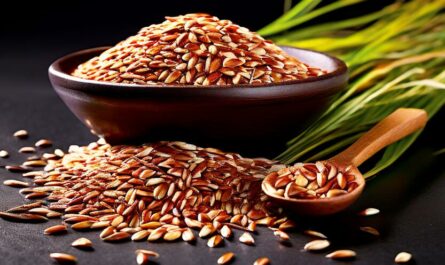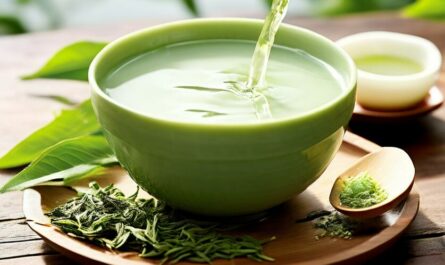Matcha is a finely ground powder made from specially grown and processed green tea leaves. It has gained immense popularity in recent years due to its unique flavor, vibrant color, and numerous health benefits. As more people incorporate matcha into their daily routines, a common question arises: does matcha have caffeine? The short answer is yes, but there’s much more to explore when it comes to this vibrant green tea powder. In this article, we’ll explore the caffeine content of matcha and how it compares to other popular beverages.
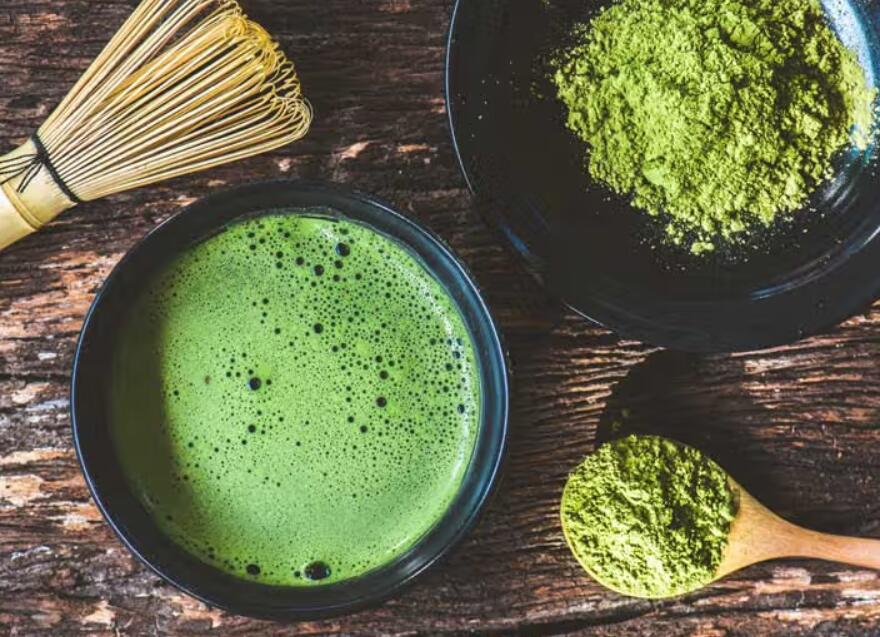
What is Matcha?
Matcha is a finely ground powder made from specially grown and processed green tea leaves. Unlike other teas, where the leaves are steeped in water and then discarded, matcha is made by grinding the entire leaf into a fine powder. This means that when you drink matcha, you’re consuming the whole leaf and all of its nutrients.
The tea plants used for matcha are grown in the shade for about 20 days before harvest, which increases the chlorophyll content and gives the leaves a vibrant green color. After harvesting, the leaves are steamed, dried, and then ground into a fine powder using stone mills.
Does Matcha Contain Caffeine?
Yes, matcha does contain caffeine. As a type of green tea, matcha naturally contains caffeine. However, the amount of caffeine in matcha can vary depending on several factors, including:
- Quality and grade of matcha
- Amount of matcha powder used
- Water temperature
- Steeping time
On average, a gram of matcha powder contains 19 to 44 milligrams of caffeine. A typical serving of matcha, which is about 2 grams of powder mixed with 3-4 ounces of water, contains approximately 70 milligrams of caffeine.
The Matcha Difference: A Gentler Caffeine Boost
While matcha may have more caffeine by volume, the experience of drinking it is quite different from coffee. Many matcha enthusiasts report a gentler, more sustained energy boost without the jitters or crashes often associated with coffee.
This difference can be attributed to the presence of L-theanine, an amino acid found in matcha. L-theanine works synergistically with caffeine, promoting a state of calm alertness. It helps balance the stimulating effects of caffeine, providing a smoother, more focused energy that can last for hours.
How Does Matcha’s Caffeine Compare to Coffee?
Now, let’s compare the caffeine content of matcha to other popular caffeinated beverages:
| Beverage | Caffeine per Gram | Typical Serving Size | Caffeine per Serving |
|---|---|---|---|
| Matcha | 19-44 mg | 2 grams | 38-88 mg |
| Coffee | 10-12 mg | 8 grams | 80-96 mg |
| Green Tea | 11-25 mg | 2 grams | 22-50 mg |
| Black Tea | 14-35 mg | 2 grams | 28-70 mg |
As you can see, matcha has more caffeine per gram than coffee. However, a typical serving of coffee (8 oz) contains more caffeine than a serving of matcha (2 grams). So, while matcha is more concentrated in caffeine, you would need to drink more of it to get the same amount of caffeine as a cup of coffee.
12 Benefits of Matcha’s Caffeine
1. Sustained Energy Release
One of the most significant advantages of matcha’s caffeine is its slow, steady release into the bloodstream. Unlike coffee, which can cause a rapid spike and subsequent crash in energy levels, matcha provides a more gradual and sustained energy boost. This is due to the unique combination of caffeine and L-theanine, an amino acid that promotes relaxation and mental clarity.
The caffeine content in matcha is comparable to that of coffee, with a single teaspoon of matcha containing about 70mg of caffeine. However, the way the body processes this caffeine is vastly different. The L-theanine in matcha helps to control the absorption of caffeine. This results in a longer-lasting energy boost without the jitters or sudden crashes associated with coffee.
2. Improved Focus and Concentration
The synergistic effects of caffeine and L-theanine in matcha have been shown to enhance cognitive function, particularly attention, memory, and reaction time. This makes matcha an excellent choice for students, professionals, or anyone looking to sharpen their mental acuity and stay focused throughout the day.
L-theanine, found in high concentrations in matcha due to the shading process before harvest, works with caffeine to promote a state of calm alertness. This “zen mode” effect has been utilized by Buddhist monks for centuries to remain calm and alert during long hours of meditation.
3. Reduced Stress and Anxiety
While caffeine is often associated with increased anxiety and jitters, matcha’s caffeine works in harmony with L-theanine to promote a state of calm alertness. L-theanine has been shown to reduce stress and promote relaxation by increasing alpha-wave activity in the brain, counteracting the potential side effects of caffeine.
The lower dosage of caffeine in matcha compared to coffee also helps prevent the “coffee jitters” that many people experience. Matcha is gentler on the stomach and less likely to cause nervousness, lightheadedness, or hunger pangs sometimes associated with coffee consumption.
4. Boosted Metabolism and Fat Burning
Studies have shown that the catechins in matcha, particularly EGCG (epigallocatechin gallate). It can boost metabolism and increase fat burning, especially during exercise. When combined with caffeine, these effects may be even more pronounced. This makes matcha a valuable ally in weight management and body composition goals.
The catechins in matcha work together with caffeine to promote thermogenesis. This increased calorie burning can lead to improved weight loss and fat reduction over time.
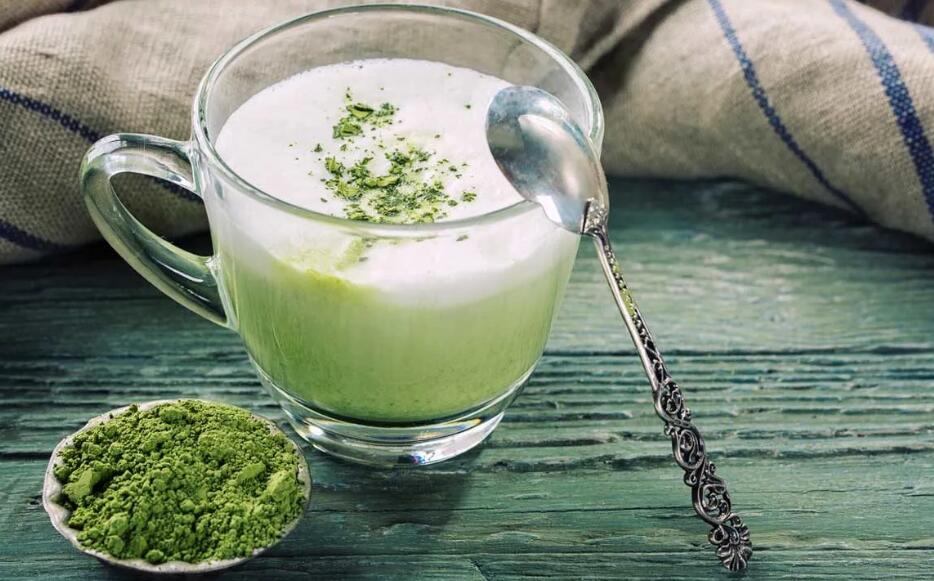
5. Antioxidant Powerhouse
Matcha is renowned for its incredibly high antioxidant content, outranking even superfoods like blueberries and spinach. The catechins in matcha, along with their caffeine content, work together to protect the body from oxidative stress and inflammation. This can help support overall health, reduce the risk of chronic diseases, and promote healthy aging.
One of the most potent antioxidants found in matcha is EGCG. It has anti-inflammatory, anti-cancer, and anti-aging properties. By consuming matcha regularly, you can help protect your cells from damage caused by free radicals and oxidative stress.
6. Improved Cardiovascular Health
Regular consumption of green tea, including matcha, has been linked to a reduced risk of heart disease. The caffeine and catechins in matcha can help lower blood pressure, reduce inflammation, and improve cholesterol levels.
Studies have shown that drinking green tea regularly can help reduce the risk of heart attack and stroke. The antioxidants in matcha help to protect the heart and blood vessels from damage, while caffeine improves blood flow and circulation.
7. Enhanced Physical Performance
Matcha’s caffeine has been shown to improve physical performance, particularly endurance and high-intensity exercise. By mobilizing fatty acids from fat tissues, caffeine can help athletes and fitness enthusiasts push through tough workouts and improve their overall performance.
The combination of caffeine and antioxidants in matcha can also help reduce muscle damage and inflammation caused by exercise. This can lead to faster recovery times and improved athletic performance over time.
8. Skin Health and Anti-Aging Benefits
The potent antioxidants in matcha, combined with its caffeine content. It can help protect the skin from damage caused by UV radiation and other environmental stressors. This can lead to a more youthful, radiant complexion and may even help slow down the visible signs of aging.
The EGCG in matcha has been shown to protect against sun damage, reduce inflammation, and promote collagen production. By drinking matcha regularly, you can help keep your skin looking healthy, smooth, and youthful.
9. Digestive Health Support
Matcha’s caffeine has been shown to stimulate the production of gastric acid and support healthy digestion. Additionally, the prebiotic properties of matcha’s unique fibers can help promote the growth of beneficial gut bacteria.
The catechins in matcha have also been shown to have anti-inflammatory effects on the digestive system. This may help reduce the risk of conditions like inflammatory bowel disease and colorectal cancer.
10. Immune System Boost
The potent antioxidants in matcha, particularly EGCG, have been shown to support the immune system by protecting cells from damage and reducing inflammation. When combined with the energy-boosting effects of caffeine, matcha can help keep your immune system functioning optimally, especially during times of stress or illness.
Studies have shown that the catechins in green tea can help enhance the function of immune cells, such as T cells and natural killer cells. This can help improve your body’s defense against viruses, bacteria, and other pathogens.
11. Mood Enhancement
In addition, the combination of caffeine and L-theanine in matcha has a positive effect on mood, promoting feelings of calm, relaxation, and well-being. This can be particularly beneficial for those who struggle with anxiety, depression, or stress-related mood disorders.
L-theanine can increase the production of alpha waves in the brain. This can help improve your overall sense of well-being and promote a more positive outlook on life.
12. Versatility and Convenience
One of the best things about matcha’s caffeine is its versatility. You can enjoy it as a traditional hot tea, cold brew, or latte, or even incorporate it into various recipes like smoothies, baked goods, and savory dishes. This makes it easy to integrate matcha’s caffeine benefits into your daily routine, no matter your preferences or lifestyle.
Matcha is also incredibly easy to prepare, requiring just a few simple tools and ingredients. Whether you’re at home, at work, or on the go, you can quickly whisk up a delicious and energizing cup of matcha to help you power through your day.
Potential Side Effects and How to Manage Intake
While matcha has many health benefits, it’s important to be mindful of your caffeine intake. Consuming too much caffeine can lead to side effects such as:
- Increased heart rate
- Jitters or anxiety
- Insomnia
- Digestive issues
To avoid these side effects, it’s best to limit your intake to no more than 2-3 cups of matcha per day. If you’re sensitive to caffeine, start with a smaller amount and see how your body reacts.
It’s also a good idea to avoid drinking matcha in the late afternoon or evening, as the caffeine can interfere with sleep. If you do consume matcha later in the day, be sure to stay hydrated and avoid consuming it on an empty stomach.
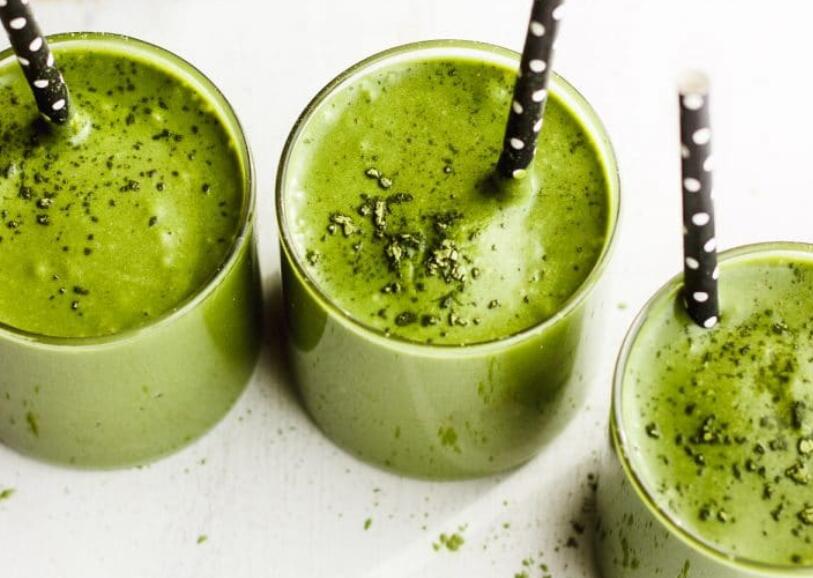
How to Control Caffeine Intake from Matcha?
If you’re looking to manage your caffeine intake from matcha, here are a few tips:
- Choose lower-caffeine varieties: Opt for ceremonial-grade matcha, which typically contains less caffeine than culinary-grade matcha.
- Adjust your serving size: Start with a smaller amount of matcha (e.g., 1/2 teaspoon) and gradually increase it to find your optimal balance.
- Be mindful of timing: Avoid consuming matcha late in the day, as the caffeine may interfere with your sleep quality.
FAQs
1. Is matcha safe for everyone to consume?
Matcha is generally safe for most people when consumed in moderation. However, individuals with caffeine sensitivity, certain health conditions, or those taking medications should consult their healthcare provider before adding matcha to their diet.
2. Can I drink matcha if I’m sensitive to caffeine?
If you’re sensitive to caffeine, you may want to start with a smaller serving size of matcha or opt for a decaffeinated variety. Pay attention to your body’s response and adjust your intake accordingly.
3. How does the caffeine in matcha compare to other teas?
Matcha typically contains more caffeine than other types of green tea, as you consume the entire leaf rather than steeping and discarding it. However, the caffeine content of matcha is still lower than that of brewed coffee.
4. Is it possible to overdose on caffeine from matcha?
While it’s unlikely to overdose on caffeine from matcha alone, consuming excessive amounts of caffeine from multiple sources can lead to adverse effects. It’s important to be aware of your total daily caffeine intake from all beverages and foods.
5. Can I drink matcha before bed without disrupting my sleep?
It’s generally recommended to avoid consuming matcha or other caffeinated beverages close to bedtime, as the caffeine may interfere with your ability to fall asleep or affect your sleep quality. If you’re sensitive to caffeine, it’s best to enjoy matcha earlier in the day.


